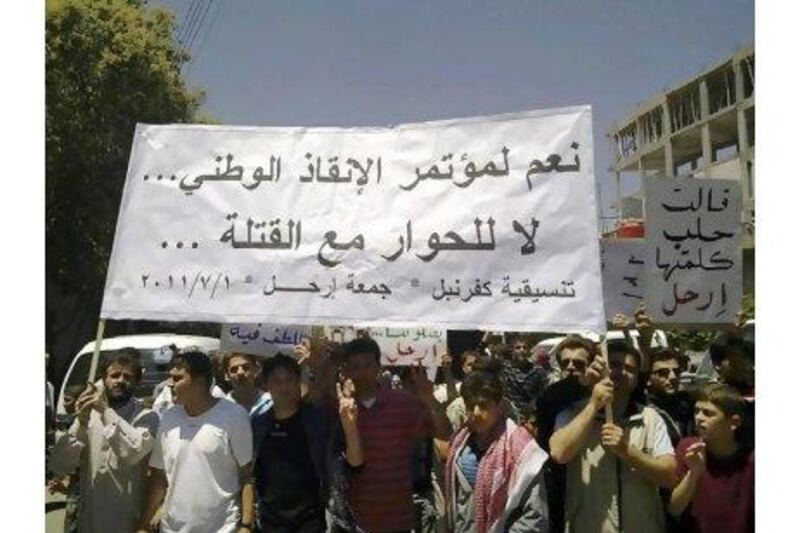DAMASCUS // More than half a million demonstrators protested across Syria yesterday, calling for President Bashar Al Assad to "leave", in what activists claimed to be the largest rallies since the uprising began.
At least six demonstrators were shot dead by security forces, according to human rights monitors: three in Homs, and three in Damascus suburbs. Three other fatalities were also reported, but had not been confirmed by activists last night.
Video: Clinton warns Syria to reform
July 2, 2011 UAE
US Secretary of State Hillary Clinton says Syria is running out of time and will face more organised resistance if it does not.
Mobile phone videos made by protesters and posted online showed a vast rally in the city of Hama, with a sea of people crowded into a main square and filling surrounding streets. Dissidents said 500,000 had taken part, joining after Friday prayers.
Another huge rally was reported in the city of Deir Ezzor, in the heart of Syria's tribal belt, with activists claiming more than 70,000 participants.
"Security forces have been pulled out of Hama and Deir Ezzor now, which is why so many people are able to protest," said one leading pro-democracy campaigner. Activists have long insisted that if the threat of deadly violence against demonstrators were lifted, protests would grow significantly beyond the tens of thousands who have been regularly taking part.
In the predominantly Kurdish city of Qamishli, protesters chanted slogans of national unity and called for the regime to be toppled.
The previous evening, Kurdish political activists were shot by police in the nearby town of Amouda, according to dissidents, who said more people had taken to the streets yesterday in response.
Until now, Syrian authorities have largely refrained from violence in Kurdish areas, in what analysts say was an attempt to prevent them joining the uprising en masse.
State run media gave a different account of yesterday's rallies, claiming that images posted by dissidents were digitally altered footage of pro-government demonstrations. Syrian television showed one pro-regime rally at the landmark Bab Touma area of Damascus, and covered similar gatherings in Aleppo to the north and Sweida to the south.
It reported three deaths, one of a civilian killed by a "gunman" in Qadam, a working class district of Damascus that has seen persistent large-scale protests, and two in Homs, including one police officer.
Syrian authorities insist they are fighting an Islamic insurgency and dismiss claims by human rights groups and the United Nations that some 1,500 civilians have been killed by security forces since the uprising began in March.
Recently officials have admitted there are protesters with legitimate political demands but they insist it is not a popular uprising. Mr Al Assad, who inherited power from his father 11 years ago, does retain strong support but in the absence of opinion polls and given media restrictions, it is difficult to accurately gauge the relative strengths of pro and anti regime blocs.
Security services have continued military operations, and a campaign of sweeping arrests against protesters, routinely sealing off demonstration areas with checkpoints. At the same time, officials have promised political reforms, saying they are now on the path to "democracy". A government sponsored "national dialogue" meeting is scheduled for July 10 as part of that effort.
Critics say such pledges have no credibility after numerous prior suggestions that reform was underway. Opposition groups have vowed not to attend talks with the government unless the army is pulled back and all political prisoners released in advance.
"What we see is that, no matter what the regime does, it has been unable to stop the protests growing," said one independent Syrian political analyst, on condition of anonymity. "The military solution has failed, and the solution of giving political promises is failing. It is hard to see how they can get out of this, short of giving the people the freedoms they are demanding."
psands@thenational.ae





